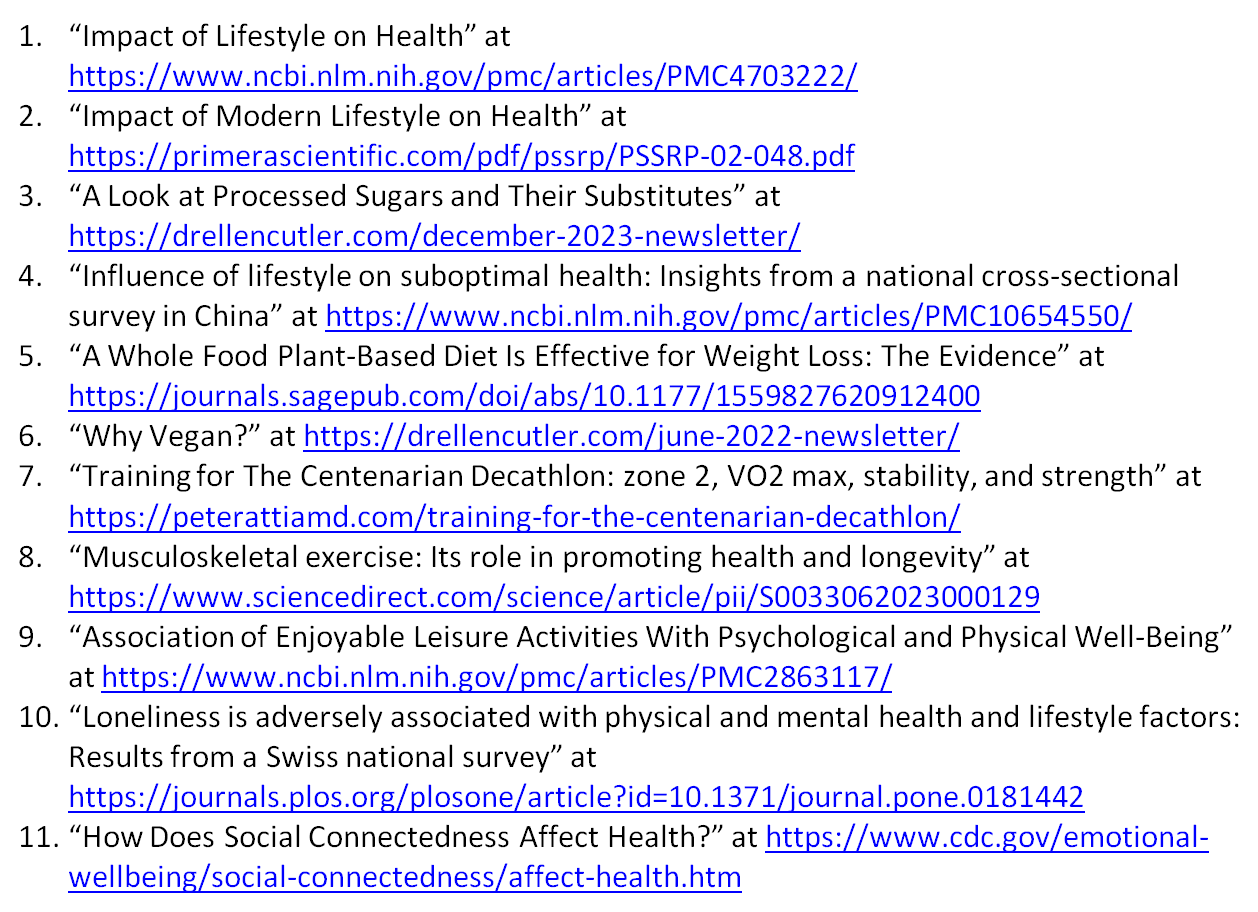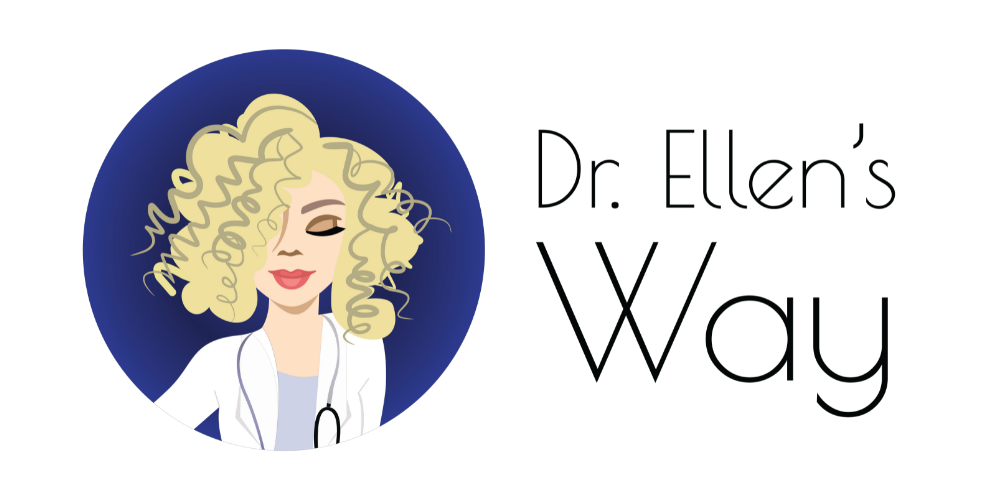The Impact of Lifestyle on Health
Hello, this is Dr. Ellen. In this month’s ‘Real Common Sense’ newsletter, I want to briefly look at a topic which I have touched upon in several previous newsletters, the relationship between your lifestyle and your health. There exists an enormous number of studies addressing the importance of maintaining an optimal lifestyle in order to maximize your health and wellness. I want to take this opportunity to share a few insights regarding one’s personal lifestyle choices that my years of clinical practice have revealed. This is done with the understanding that we are all individuals and ‘one person’s food is another’s poison’, so to speak!
By the way, if you haven’t had a chance to see my previous newsletters, you can find them on my website, www.drellencutler.com under ‘Media’.
What are the Lifestyle Choices we make that Impact Health?
There can be positive or negative consequences resulting from our lifestyle choices.(1) Perhaps the longest recognized of those choices have been addictions, which have decidedly negative health effects. Those most often discussed have been addictions to tobacco, alcohol, and recreational drugs. These are responsible for various health issues like asthma, cardiovascular disease, cancer, and brain injury, as well as depression and anxiety, all of which can result in a fatal outcome.(2) I would also note that there are so-called ‘foods and beverages’ that could easily be considered as addictive. These include ‘foods’ that are ‘ultra-processed’, which have been depleted of nutrients and may contain potentially harmful compounds resulting from their processing. These also include foods and beverages that contain many of the food additives that can lead to long term cravings and detrimental health effects, such as those seen with processed sugars and artificial sweeteners.(3)
Perhaps the three most commonly discussed modifiable lifestyle choices are those dealing with dietary habits, regular physical activity and exercise, and sleeping patterns.(4) In my practice (and in my own personal experience) the most successful dietary pattern I have seen for promoting health and wellness has been one that emphasizes a whole food plant-based diet.
Studies have shown it to be one of the most effective dietary patterns for weight loss and actual improvement in those with heart disease, type 2 diabetes, and hypertension.(5) Oftentimes, individuals are initially resistant to making an immediate change to a purely whole food plant-based diet and are instead encouraged to make stepwise changes. This trajectory is frequently well tolerated and typically leads to definite health benefits.(6)
Regarding physical activity and exercise, I have found that a well-rounded, fairly regular routine or program that is easy and dare I say fun to do is the most beneficial. Aerobic training should consist of activities that are at a low-intensity, steady pace during which you can maintain a casual conversation over time (i.e., Zone 2); examples would be moderate to brisk walking, dancing, or casual cycling. More vigorous aerobic exercise should ideally be added to help support your ability to take up and use oxygen (i.e., VO2 max), such as more vigorous cycling or running.(7) Aerobic activities should be complemented by resistance-type training, which can improve health and wellness by increasing muscle strength and mass, increasing bone density, reducing body fat and other cardiac risk factors, and promoting cognitive function and psychological well-being. Ideally, a regular exercise/activity program can be established and advanced with the guidance and/or approval of one or more healthcare professionals.(8)
Sleep deprivation and poor sleep patterns have become widespread due to lifestyle choices and environmental factors. As many as one-third of adults are not getting enough sleep. This is primarily due to lifestyle choices such as consuming too much alcohol, drinking caffeine in excess or too late in the day, irregular work times, excessive time on electronic devices, and mental stress. Impaired sleep can contribute to various chronic conditions including diabetes, hypertension, obesity, heart disease and stroke, and can also increase the risk of physical injury. Regular nightly restorative sleep definitely contributes to health and wellness. Sleep helps with the recovery from the various physical and mental stressors that are experienced every day.(2) The general sweet spot for the ideal amount of sleep every night is between 7 and 8 hours.
Other important lifestyle choices affecting your health are those involving leisure time activities and social interactions. For example, those engaging in more frequent enjoyable leisure activities have been found to have lower blood pressure, cortisol levels, waist circumference, and body mass index (BMI) as well as greater perceptions of better physical function. They also have more positive psychosocial states and lower levels of negative emotions, including depression.(9) Also, those activities bringing each of us into a comfortable setting for social interaction tend to prevent feelings of loneliness. Lonely individuals are more likely to be affected by physical and mental health problems, including self-reported chronic diseases, impaired self-perceived health, high cholesterol levels, diabetes, psychological distress, and depression.(10) Conversely, people that are socially connected with stable and supportive relationships are more likely to make healthy lifestyle choices, have better mental and physical health outcomes, and are better able to cope with stressful circumstances and negative emotions.(11)
Ellen Cutler Method (ECM)
In my clinical practice, I have had the opportunity to use ECM energetic testing and desensitization to help people make their optimal lifestyle choices. There are different challenges facing each individual. For example, a person that wants to change to the dietary pattern that would be healthiest for them is faced with the reality of having to remove many foods that are familiar and comforting to them. For many, the best approach is to gradually change their diet in the optimal direction over time. For most individuals, that optimal direction is toward a whole food plant-based diet. By using ECM testing, I can facilitate the change by determining the best initial dietary pattern and help desensitize any impediments to that change that are discovered with the testing. This may include the discovery of one or more food sensitivities and reactivities to their psychosocial environment. I am happy to report that many individuals have been able to successfully move toward a more healthy lifestyle with the use of ECM.
Please be well, be healthy, and remember…
“The doctor of the future will give no medicine, but will instruct his patients in care of the human frame, in diet, and in the cause and prevention of disease.”
― Thomas Edison
Dr. Ellen
References:

* These statements have not been evaluated by the Food and Drug Administration. This product is not intended to diagnose, treat, cure, mitigate, or prevent any disease.
